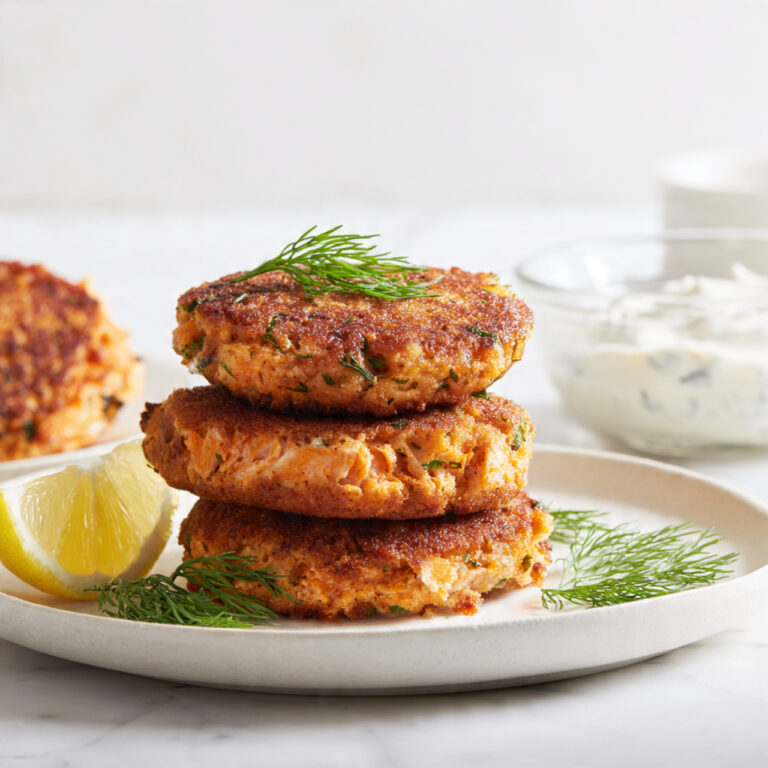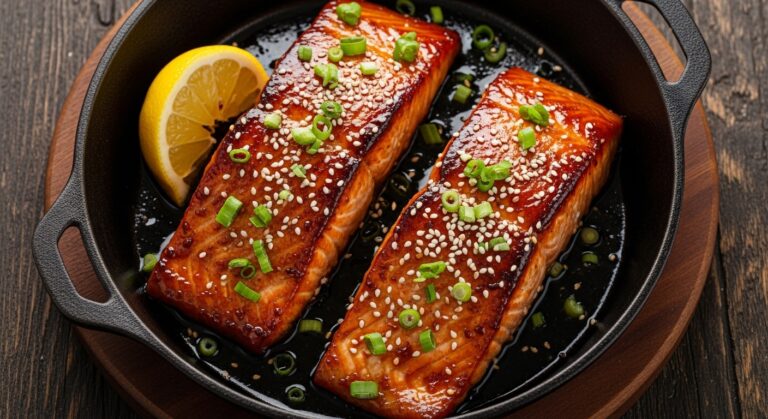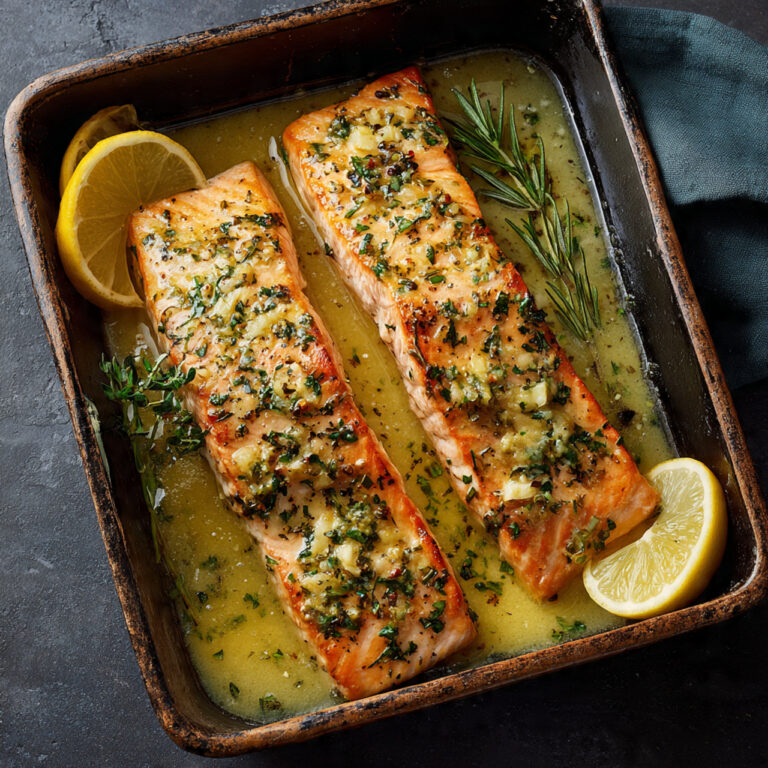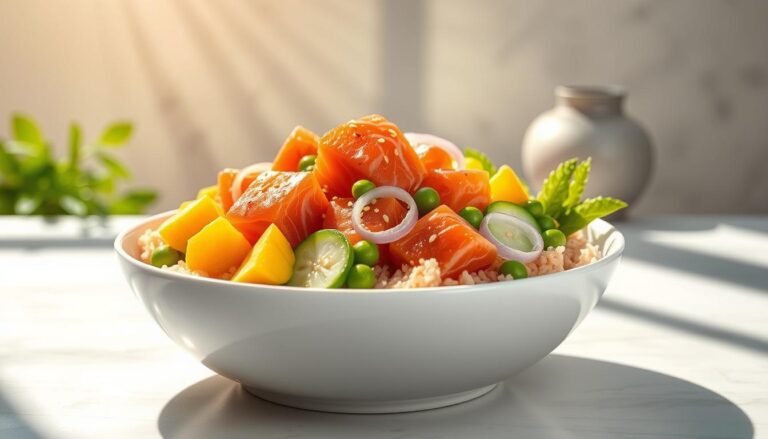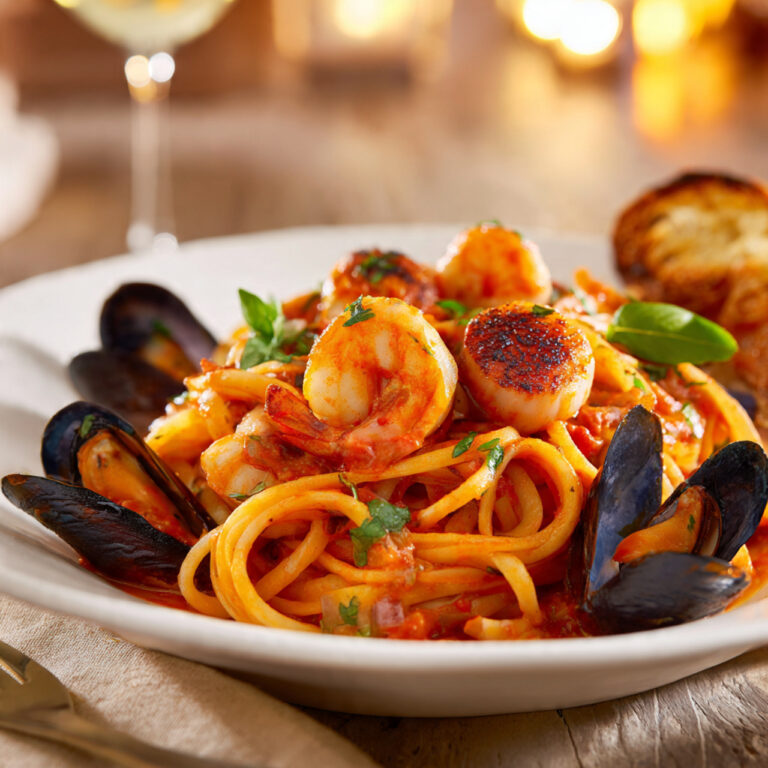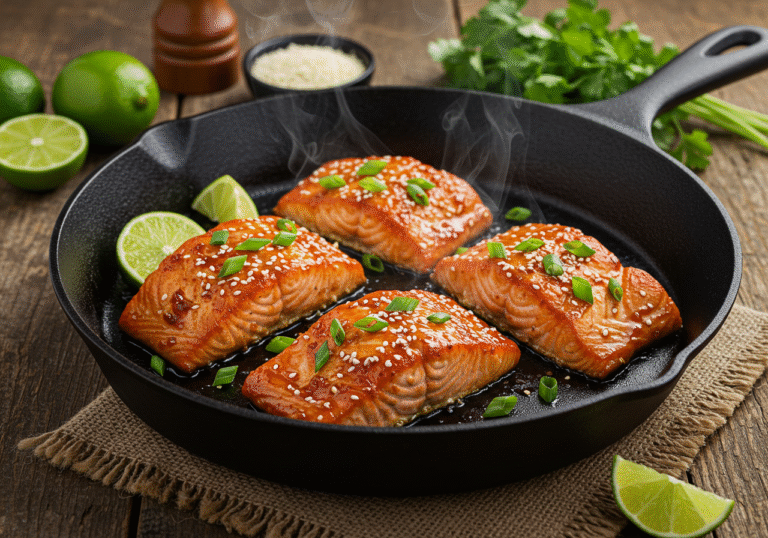How to Cook Perfectly Grilled Salmon Steak Recipe
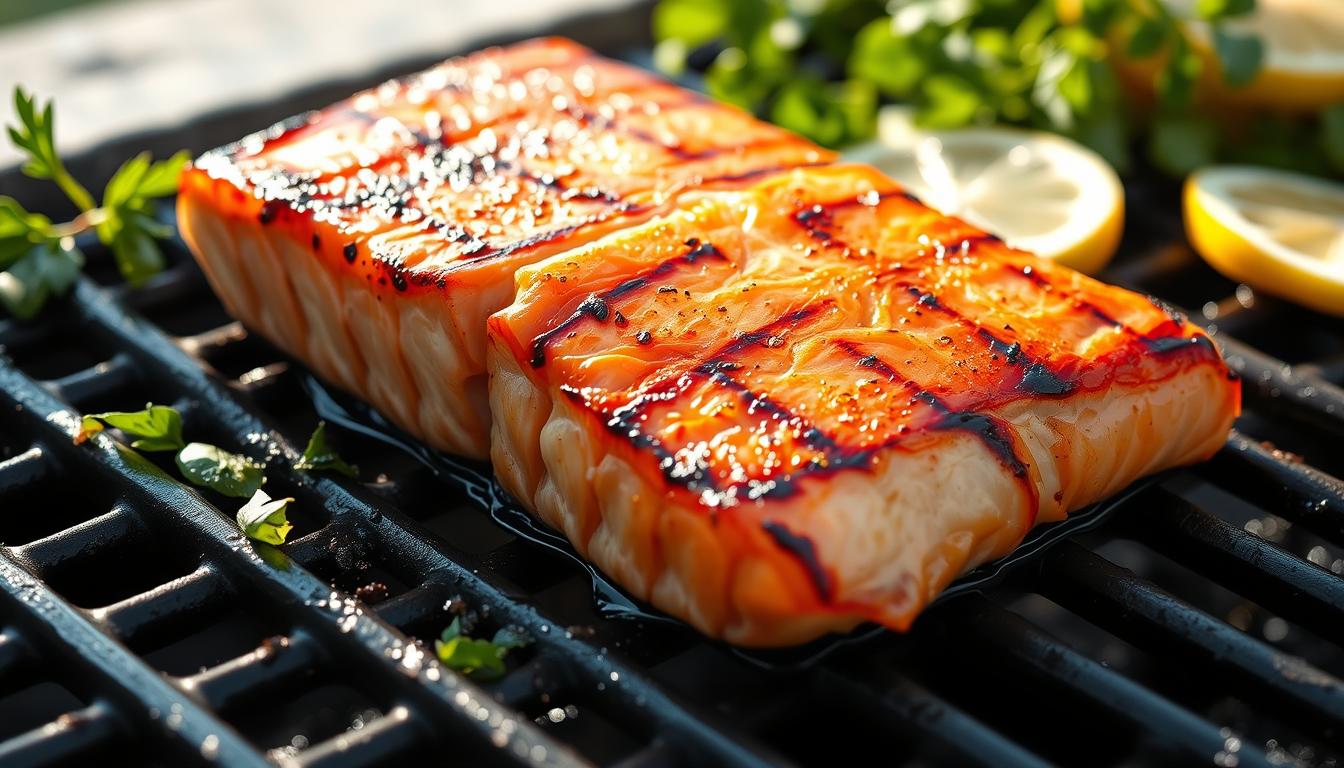
Every summer evening, I remember the sizzle of salmon steaks on the grill. It’s a memory that makes a simple meal special. Your journey to mastering the perfect salmon steak recipe starts here, where quick cooking meets mouthwatering flavor.
Grilled salmon steaks are a summer dinner game-changer. In less than 15 minutes, you can make a dish that’s moist, smoky, and full of flavor. Whether you’re new to cooking or a seasoned chef, this salmon steak recipe will boost your grilling skills.
Preparing delicious grilled salmon steaks is more than just technique. It’s about turning fresh fish into a memorable meal. With the right approach, you’ll create a dish that’s both impressive and easy to make.
Table of Contents
Understanding Salmon Steaks vs Fillets
Exploring wild-caught salmon reveals the differences between steaks and fillets. Each type has its own flavor, texture, and cooking methods.
Salmon cuts vary a lot in structure and use in cooking. Let’s explore the world of salmon nutrition facts and how they’re cut.
What Makes a Salmon Steak Different
Salmon steaks offer a rich, bold cooking experience. They include:
- A portion of the spine
- Skin along the edges
- Thick, meaty sections of flesh
Bone Structure and Cutting Methods
The cutting process for salmon steaks is precise. Unlike fillets, steaks are cut perpendicular to the spine. This makes them sturdy and unique.
| Salmon Steaks | Salmon Fillets |
|---|---|
| Cut crosswise | Cut lengthwise |
| Include bone | Boneless |
| Firmer texture | Delicate texture |
| Better for grilling | Ideal for baking |
Choosing Between Steaks and Fillets
Your cooking method and taste preferences decide. Wild-caught salmon steaks are great for grilling. Fillets are better for gentle cooking.
Pro tip: Brining salmon steaks can help retain moisture and enhance flavor during cooking.
Essential Ingredients for Grilled Salmon
Starting with the right ingredients is key to making tasty healthy salmon recipes. A good grilled salmon needs a few important parts. These parts make the fish taste better and keep the dish healthy.
Your essential salmon marinade ingredients should include:
- Olive oil (5 tablespoons) – provides moisture and helps distribute heat evenly
- Fresh herbs like parsley and thyme – add depth and aromatic complexity
- Acid components such as lemon juice or rice vinegar – tenderize the fish
- Seasonings like kosher salt, black pepper, and garlic
Adding flavor boosters to your salmon marinade can make a big difference. Try using grated ginger, minced garlic, honey, or soy sauce. A good marinade has:
- 1-2 tablespoons of sweetener (brown sugar or honey)
- 1 tablespoon of acid (lime juice or rice vinegar)
- 2 tablespoons of oil
- Herbs and spices to taste
Remember, marinate salmon for 15-30 minutes max. This prevents it from getting too soft. Your marinade should enhance the fish’s flavor, not hide it.
Selecting the Perfect Salmon Steak
Choosing the right salmon steak can make your cooking stand out. Whether you’re cooking at home or love seafood, picking high-quality wild-caught salmon is key. It helps you make tasty meals that highlight the best of sustainable seafood.
When looking for the perfect salmon steak, consider a few important factors. These impact the flavor, texture, and quality of your dish.
Fresh vs Frozen Salmon Options
Fresh and frozen salmon have their own benefits for home cooks. Fresh salmon is great for immediate enjoyment. Frozen salmon can be just as tasty if stored right. Here are some tips:
- Fresh salmon should be used within 1-2 days of purchase
- Frozen salmon can be stored up to 6-9 months
- Always thaw frozen salmon in the refrigerator for best results
Wild-Caught vs Farm-Raised Salmon
The debate between wild-caught and farm-raised salmon is ongoing. Wild-caught salmon usually has:
- More robust flavor profile
- Higher nutritional value
- Lower environmental impact
Quality Indicators to Look For
| Salmon Type | Flavor Profile | Texture | Price Range |
|---|---|---|---|
| King (Chinook) | Rich, buttery | Soft, tender | $19.99 – $39.99/lb |
| Sockeye | Deep, rich | Firm | $14.99 – $29.99/lb |
| Coho (Silver) | Mild, slightly sweet | Medium-firm | $12.99 – $22.99/lb |
When picking salmon steaks, look for these signs of quality:
- Vibrant, uniform color
- Clearly defined flesh flakes
- No ammonia-like smell
- Avoid signs of freezer burn
Pro tip: For best results, wrap your salmon steak securely in plastic wrap and store in an airtight container. This helps keep its quality and flavor.
Preparation and Marination Techniques
Making the perfect salmon marinade turns a simple dinner into a feast. Preparing your salmon steaks needs care and skill. This ensures great flavor and texture.
Before you start, dry your salmon steaks with paper towels. This step is key to get a perfect sear and avoid sticking.
Essential Marinade Components
- 2 tablespoons extra-virgin olive oil
- 2 tablespoons reduced-sodium soy sauce
- 2 tablespoons fresh lemon juice
- 1 tablespoon honey
- 1 teaspoon garlic powder
- Fresh herbs (parsley or dill)
- Salt and pepper to taste
To make a top-notch marinade, mix these ingredients in a bowl. It’s all about finding the right mix of acidic, sweet, and savory flavors.
Marination Process
Put the marinade in a big zip-top bag. Carefully add your salmon steaks, making sure they’re all coated. Pro tip: Choose salmon steaks of the same size for even cooking.
Then, refrigerate the salmon for 30 minutes. Don’t marinate it for more than an hour. This way, your salmon will be both flavorful and tender, sure to wow your guests.
Basic Salmon Steak Recipe
Making an easy salmon steak dinner is simple. This recipe will guide you to a tasty meal that’s both impressive and easy. It’s great for anyone, whether you’re new to cooking or have lots of experience.
Ingredients You’ll Need
- 4 salmon steaks (5-6 ounces each)
- 3 tablespoons softened salted butter
- 2 garlic cloves, minced
- 2 tablespoons fresh herbs (chives and parsley)
- 1 tablespoon olive oil
- Salt and freshly ground black pepper
- Lemon wedges for serving
Preparation Steps
- Pat the salmon steaks dry with paper towels
- Season both sides with salt and pepper
- Heat olive oil in a cast iron skillet over medium-high heat
- Sear salmon steaks for 3-5 minutes on each side
- Add compound butter to the pan after flipping
- Spoon butter mixture over salmon while cooking
- Serve with fresh lemon wedges
Cooking Times and Temperatures
For the perfect salmon steak recipe, follow these key cooking guidelines:
- Cooking Temperature: Medium-high heat (around 400°F)
- Total Cooking Time: 6-10 minutes
- Per Side: 3-5 minutes
- Doneness: Salmon should flake easily with a fork
For a better easy salmon steak dinner, make sure butter is at room temperature. Also, make sure your salmon steaks are the same size for even cooking. Serve it right away with your favorite sides for the best taste and texture.
Grilling Methods: Indoor and Outdoor Options
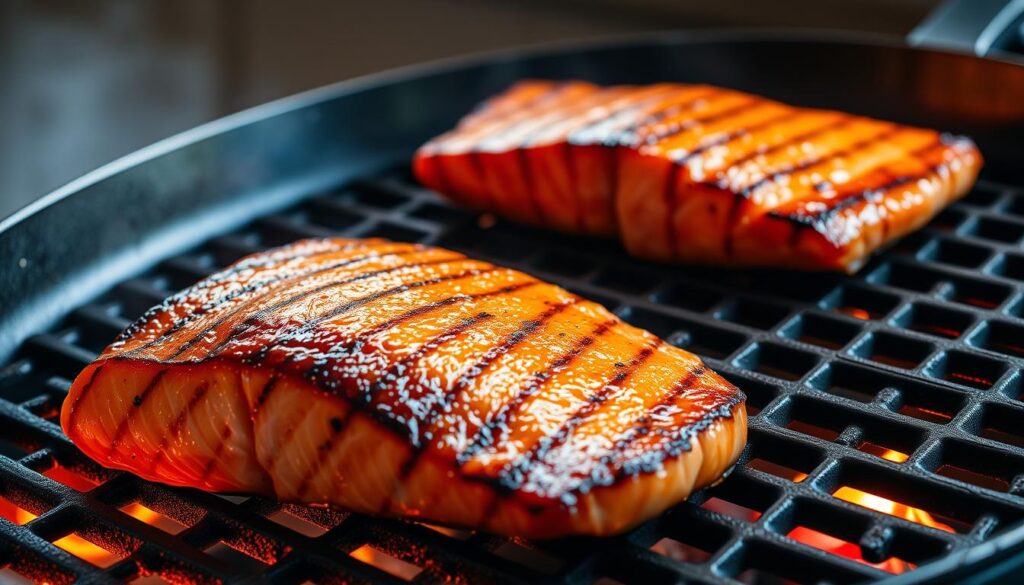
Cooking grilled salmon steaks can be done in many ways. You can grill outside or pan-sear indoors. Each method adds its own flavor and texture to your dish.
Outdoor grilling is the top choice for delicious salmon steaks. A Weber Performer Premium Charcoal Grill can make your cooking better. Here’s how to start:
- Use grape seed or extra virgin olive oil for coating
- Season with kosher salt and freshly ground black pepper
- Cook salmon skin side down for 6-8 minutes
- Flip and cook flesh side down for 2-4 minutes
- Let the salmon rest 1-2 minutes after cooking
If you don’t have an outdoor grill, pan-searing is a great choice. Season the salmon well, heat a pan, and sear for 3-5 minutes on each side. Make sure the inside reaches 145°F (63°C).
Baked salmon steaks are also easy to make at home. Keep the temperature right and don’t overcook. Pro tip: Use a meat thermometer to ensure perfect doneness every time.
Experiment with different grilling methods to discover your favorite way of preparing salmon steaks!
Maple Soy Glazed Salmon Steak Recipe
Take your healthy salmon recipes to the next level with this amazing maple soy glazed salmon marinade. It turns a simple meal into a work of art. The mix of sweet and savory flavors makes it a hit with everyone.
This marinade packs rich flavors that get even better when cooked. Be careful not to burn it, as it can get sweet and caramelized. You’ll love the golden-brown crust it creates.
Marinade Ingredients
- 2 tablespoons reduced sodium soy sauce
- 1 tablespoon maple syrup
- 1 tablespoon honey
- Kosher salt and ground black pepper
- Optional: Dijon mustard for extra tang
Glazing Techniques
Start by drying the salmon with paper towels before glazing. Marinate it for 30 minutes to 8 hours. Brush the glaze every 3-5 minutes to add layers of flavor.
Cooking Method
- Preheat oven to 425°F (218°C)
- Cook salmon for 10 minutes
- Finish under the broiler for 2-3 minutes
- Ensure internal temperature reaches 145°F (63°C)
For easy cleanup, line your baking sheet with aluminum foil. Add toasted sesame seeds or green onions for extra taste.
Nutritional Insights
Each serving has about 279 calories and 38.3g of protein. It’s perfect for those watching their diet. Use sockeye, king, or coho salmon for the best results.
Perfect Timing and Temperature Guide
Mastering the perfect salmon steak recipe is all about temperature control and timing. It’s not just about the heat. It’s about how temperature affects flavor and texture.
To get exceptional grilled salmon steaks, keep the grill at a low heat. Aim for a temperature around 300°F. This helps keep the meat moist and prevents it from getting too dry.
- Optimal grill temperature: 300-375°F
- Cooking time: 4-7 minutes per side
- Target internal temperature: 130-140°F
The thickness of the salmon steak affects cooking time. Thinner steaks cook faster, while thicker ones need more time. It’s important to watch them closely to avoid drying out.
| Salmon Steak Thickness | Cooking Time | Internal Temperature |
|---|---|---|
| 1/2 inch | 3-4 minutes per side | 130°F |
| 1 inch | 5-7 minutes per side | 135°F |
| 1.5 inches | 7-9 minutes per side | 140°F |
Look out for white streaks in the meat. They mean it’s overcooked. Take your salmon steaks off the grill when they’re just right, at medium-rare to medium doneness.
Pro tip: Let your grilled salmon steaks rest for 3-5 minutes after cooking. This lets the juices spread evenly.
Seasoning and Flavor Enhancement Tips
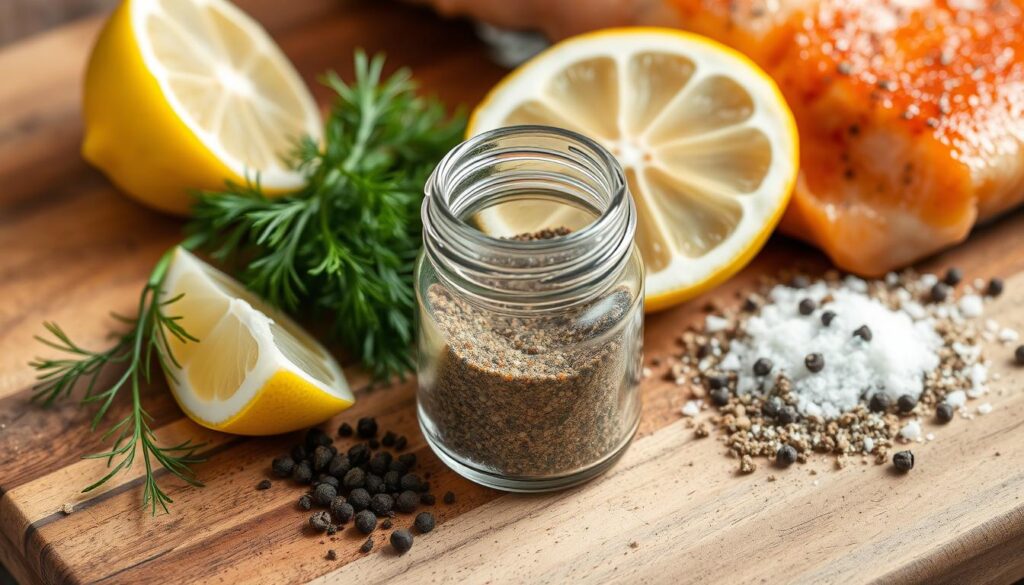
Improving your salmon marinade is like turning a simple dish into a work of art. Healthy salmon recipes begin with knowing how to enhance flavor without overpowering the fish.
Creating the perfect seasoning mix is all about precision and creativity. Experts suggest a strong spice blend to highlight salmon’s subtle tastes:
- ¼ cup granulated onion
- ¼ cup granulated garlic
- ¼ cup dried oregano
- ¼ cup paprika
- 1 tablespoon black pepper
- 2 tablespoons salt
Here are key tips for your salmon marinade:
- Pat the salmon dry with paper towels before seasoning
- Use 1 to 1½ tablespoons of seasoning per pound of salmon
- Apply spices just before cooking for maximum flavor
“The secret to an incredible salmon dish lies in understanding how to balance herbs and spices.” – Culinary Expert
Want to try something different? Mix up your herbs:
| Herb Combination | Flavor Profile |
|---|---|
| Garlic, Rosemary, Thyme | Classic Mediterranean |
| Tarragon, Marjoram | Delicate and Aromatic |
| Dill, Lemon | Fresh and Bright |
Pro tip: Keep your custom seasoning blend in an airtight container for up to 6 months. This makes it easy to whip up tasty healthy salmon recipes anytime!
Serving Suggestions and Pairings
Creating an easy salmon steak dinner is more than just the fish. The right side dishes can turn your meal into a memorable experience. It will delight both your eyes and taste buds.
When picking side dishes, look for flavors that complement the salmon. You want to make sure the salmon is the main attraction. Aim for a balanced, nutritious plate that highlights the salmon steak.
Perfect Side Dish Selections
- Crispy smashed Brussels sprouts for textural contrast
- Lemon-dill vinaigrette potato salad for a refreshing touch
- Bright heirloom tomato salad with mustard vinaigrette
- Creamy white beans with roasted broccoli and greens
- Air-fried asparagus with cheese sauce and breadcrumbs
Plating Presentation Tips
Your plating can make a simple salmon steak dinner look amazing. Use white plates to make the salmon’s color stand out. Here are some tips:
- Place the salmon slightly off-center
- Arrange side dishes in small, artistic clusters
- Garnish with fresh herbs like dill or parsley
- Use a light drizzle of sauce for visual appeal
“A beautifully presented meal is a feast for both the eyes and the palate.” – Culinary Expert
By choosing light, vibrant sides and focusing on presentation, you’ll make healthy salmon recipes that are stunning and delicious.
Storage and Leftover Management
After enjoying your easy salmon steak dinner, it’s important to store leftovers right. This keeps the flavor and nutrition of your salmon. Your leftover salmon can stay tasty and safe if stored correctly.
Here are key tips for storing cooked salmon:
- Refrigerate within two hours of cooking
- Use an airtight container to prevent moisture loss
- Store in the refrigerator for up to 3-4 days
Freezing is also a great way to keep your salmon steaks fresh. Wrap individual portions in plastic wrap or freezer paper before putting them in a freezer-safe container. Frozen salmon stays good for about two months.
There are many ways to use leftover salmon. Here are a few ideas:
- Salmon salad sandwiches
- Flaked salmon in pasta dishes
- Salmon-topped green salads
- Salmon patties or croquettes
When reheating, use gentle methods to keep the salmon moist. A low-temperature oven (around 275°F) or brief microwave warming works well. This helps keep the salmon’s moisture and nutrients.
Pro tip: Always check for signs of spoilage like unusual odor, discoloration, or slimy texture before consuming refrigerated salmon.
Conclusion
Learning to make the perfect salmon steak recipe is a fun journey. It mixes skill, taste, and health. By mastering how to pick, prepare, and grill salmon steaks, you can turn a simple meal into a special event. You’ll be able to make dishes as good as those in restaurants, right in your own kitchen.
Choosing sustainable seafood is key to enjoying salmon the right way. Opting for high-quality salmon steaks from trusted sources means you get a tasty meal. It also helps the environment by supporting eco-friendly fishing. Each salmon steak is a chance to try new cooking ways and flavors, keeping the fish’s natural taste.
Your salmon steak adventure is just starting. Keep practicing and trying new things to get better at cooking. Whether you like King, Sockeye, or Coho salmon, each type brings something special to your dishes. Remember, the secret to amazing seafood is freshness, the right temperature, and careful preparation.
Start cooking salmon steaks with excitement and creativity. Your kitchen is now a place to discover tasty, healthy, and eco-friendly seafood. Enjoy your journey in the world of cooking!
FAQ
What’s the difference between salmon steaks and salmon fillets?
Salmon steaks are cut across the spine, with a bone in the middle. Fillets, on the other hand, are boneless and run along the spine. Steaks are firmer and better for grilling. Fillets are softer and good for many cooking methods.
How do I choose the best quality salmon steaks?
Look for bright, vibrant salmon with firm flesh and a clean smell. Wild-caught salmon tastes better and is healthier. Avoid any signs of spoilage like discoloration or a strong smell.
What’s the recommended cooking time for salmon steaks?
Cook salmon steaks for 4-6 minutes on each side. They should reach 145°F (63°C) inside. For a 1-inch steak, grill for 4-5 minutes per side until they’re opaque and flake easily.
Can I cook salmon steaks if I don’t have an outdoor grill?
Yes! You can pan-sear or bake salmon steaks. For pan-searing, use medium-high heat for 3-4 minutes per side. Bake at 400°F (204°C) for 10-12 minutes, depending on the steak’s thickness.
How can I prevent my salmon steaks from sticking to the grill?
Clean and oil your grill grates before cooking. Dry the salmon steaks with paper towels. Brush the fish and grates with avocado or grapeseed oil. This makes the surface non-stick and helps with grill marks.
What are some healthy marinade options for salmon steaks?
Use olive oil, lemon juice, and herbs like dill or parsley. You can also mix soy sauce, ginger, and a bit of maple syrup. These marinades boost flavor and add nutrients without making the dish heavy.
How long can I store leftover grilled salmon steaks?
Store cooked salmon in an airtight container in the fridge for 3-4 days. For the best taste, eat it within 2 days. Freeze them tightly wrapped in plastic and foil for up to 3 months.
Is wild-caught or farm-raised salmon better?
Wild-caught salmon is often better in taste, nutrition, and for the environment. It has more omega-3s and fewer contaminants. But, high-quality farm-raised salmon can also be good, especially from sustainable farms.
Source Links
- Grilled Salmon Steaks with Creamy Mustard Chive Sauce – https://downshiftology.com/recipes/grilled-salmon-steaks-creamy-mustard-chive-sauce/
- Grilled Salmon Steaks – https://www.tasteofhome.com/recipes/grilled-salmon-steaks/?srsltid=AfmBOor46gjLTk58yinfc9ysf24bCaf–3Qk_Q3wbcXOJBn2aIeeC-kW
- Pan-Seared Salmon Steak Recipe — Zestful Kitchen – https://zestfulkitchen.com/salmon-steak-recipe/
- Salmon Steaks vs. Fillets – Best Cuts, Cooking Tips & Recipe – https://globalseafoods.com/blogs/recipes/delicious-and-nutritious-salmon-steaks-a-perfect-recipe-for-a-healthy-meal?srsltid=AfmBOooWxWpnlu6Hra9e_bHL0i7ub6rr3DRHyxrE5DruQK8uqjtegIZA
- Salmon Steak Pan-Fried in Butter (15-Minute Recipe!) – Healthy Recipes Blog – https://healthyrecipesblogs.com/salmon-steaks-recipe/
- Grilled Salmon Steak – https://www.foodfidelity.com/grilled-salmon-steak/
- Grilled Salmon with Garlic and Herbs – https://www.dinneratthezoo.com/grilled-salmon/
- Easy 15-Minute Grilled Salmon – Healthy Recipes Blog – https://healthyrecipesblogs.com/grilled-salmon/
- Salmon Steaks vs. Fillets – Best Cuts, Cooking Tips & Recipe – https://globalseafoods.com/blogs/recipes/delicious-and-nutritious-salmon-steaks-a-perfect-recipe-for-a-healthy-meal?srsltid=AfmBOoo52nSilKH_tITWgeDvFqeWvlRFlgThY7kNAMsqOnh27iilxBa1
- Salmon Steak — Nutrients, Health Benefits, and Shopping Tips – https://listonic.com/p/nutrition/salmon-steak
- Salmon Marinade (Grill Or Oven) – Wholesome Yum – https://www.wholesomeyum.com/salmon-marinade/?srsltid=AfmBOoqhDY0LO6w8r_VM7-VbX5NIXUopnrUlNJM9MKFUJeriC82i63ZD
- Greek Salmon Steak Recipe – https://weekdaypescatarian.com/salmon-steak-recipe/
- The Only Salmon Marinade Recipe You’ll Ever Need – https://www.eatingwell.com/easy-salmon-marinade-8695873
- Garlic Butter Salmon Steak | Primavera Kitchen – https://www.primaverakitchen.com/garlic-butter-salmon-steak/
- Salmon Steak Recipe – A Well Seasoned Kitchen – https://www.seasonedkitchen.com/roasted-salmon-steaks
- Oven Baked Salmon Steaks – CucinaByElena – https://www.cucinabyelena.com/easy-oven-baked-salmon-steaks-recipe-healthy/
- Master the Art of How to Cook Salmon Steaks Perfectly – https://kyokuknives.com/blogs/kyoku-chef-blog/how-to-cook-salmon-steaks-perfectly?srsltid=AfmBOoqm_tluPnluweHpCOCNZyyBFPdZP6aZigkQ5o6_VvCAKXFt7oPX
- How to Make THE BEST Grilled Salmon – foodiecrush .com – https://www.foodiecrush.com/best-grilled-salmon/
- Perfect 15-Minute Grilled Salmon – The Seasoned Mom – https://www.theseasonedmom.com/grilled-salmon/
- Maple Soy Glazed Salmon – https://www.inspiredtaste.net/64999/glazed-salmon/
- 4-Ingredient Honey Maple Glazed Salmon | The Seasoned Mom – https://www.theseasonedmom.com/baked-salmon-recipe/
- The Best Temperature for Perfectly Baked Salmon Every Single Time – https://www.simplyrecipes.com/best-temperature-for-baking-salmon-8779005
- Baked Salmon – https://www.wellplated.com/baked-salmon-in-foil/
- This Oven-Baked Garlic-Butter Salmon Is The Easiest Way To Feed A Crowd – https://www.delish.com/cooking/recipe-ideas/a55315/best-baked-salmon-recipe/
- The Perfect Salmon Seasoning – https://www.laurafuentes.com/salmon-seasoning/
- Herb Salmon – https://www.tasteofhome.com/recipes/herb-roasted-salmon-fillets/?srsltid=AfmBOoqleqqy7L_K3YgE9KWhx-a896awtSk96hr25jFBY5DQYHFStU5v
- Salmon Steak – https://www.tasteofhome.com/recipes/special-salmon-steaks/?srsltid=AfmBOopt3tFkq3ibqvIkyOoN7wmFz9U3N1C1T_lvZ4iyemdp5BxOAymJ

